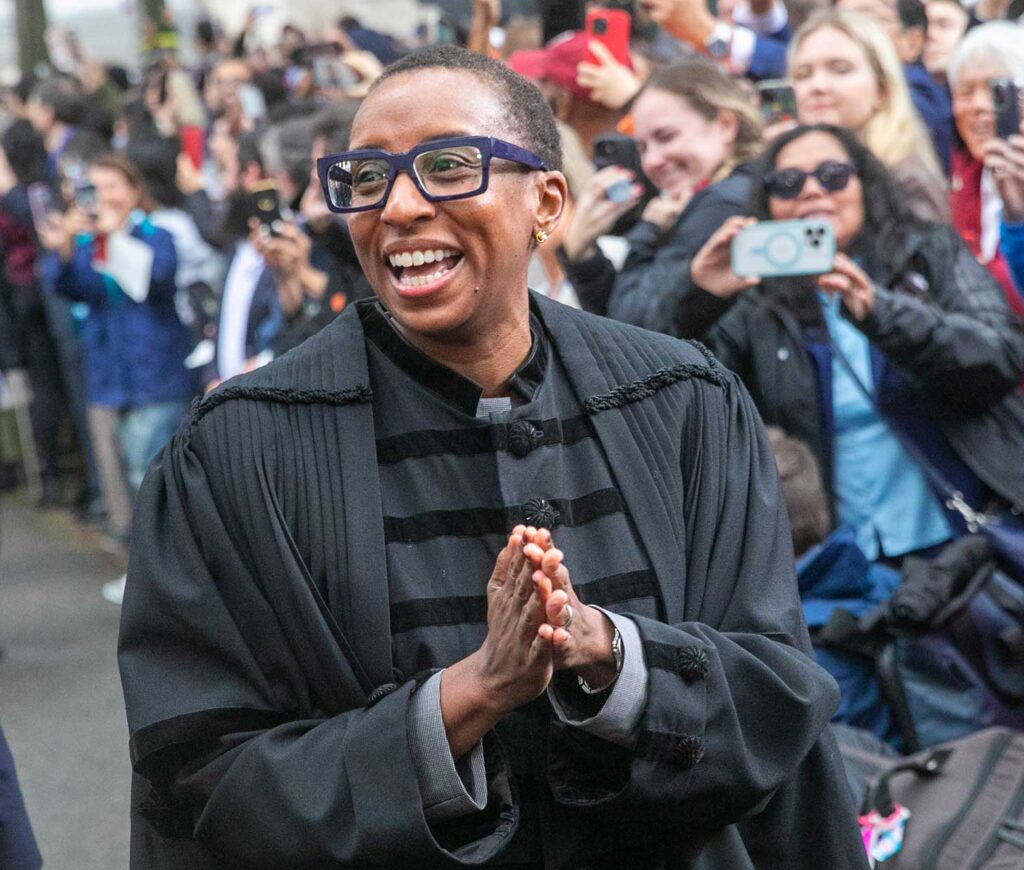
Capping off a stunning series of events, Claudine Gay, the first Black woman to ever lead Harvard University, announced Tuesday that she is resigning from the presidency after less than six months on the job.
The resignation follows a string of crises that have haunted her since her less-than-stellar testimony before Congress about the university’s policy on antisemitism and as calls for her resignation intensified. She also faced growing allegations of plagiarism.
Provost Alan M. Garber, Harvard’s chief academic officer and a 1976 graduate of Harvard College, will serve as interim president, effective immediately. Gay will return to the Harvard faculty, where she has served as a professor of government since 2006, Harvard authorities said.
In a letter to the Harvard community, Gay said she is stepping down as president with a heavy heart and deep love for Harvard. She noted the divisions and vitriol on campus over the past weeks, death threats she received, and doubts that surfaced about her scholarship and commitment to confronting hate.
“This is not a decision I came to easily,” she wrote in the letter, the full content of which was published on major news sites. “Indeed, it has been difficult beyond words because I have looked forward to working with so many of you to advance the commitment to academic excellence that has propelled this great university across centuries.”
She said that after consulting with members of Harvard’s Corporation, it became clear that “it is in the best interests of Harvard for me to resign so that our community can navigate this moment of extraordinary challenge with a focus on the institution rather than any individual.”
The fellows of the Harvard Corporation, the university’s senior governing body, thanked Gay “for her deep and unwavering commitment to Harvard and to the pursuit of academic excellence,” according to their statement to the Harvard community.
They noted that Gay has devoted her career to an institution whose ideals and priorities she has worked tirelessly to advance, adding that they are grateful for the extraordinary contributions Gay has made — and will continue to make — as a leader, a teacher, a scholar, a mentor and an inspiration to many. They said they accepted her resignation.
“We do so with sorrow,” the statement said. “While President Gay has acknowledged missteps and has taken responsibility for them, it is also true that she has shown remarkable resilience in the face of deeply personal and sustained attacks. While some of this has played out in the public domain, much of it has taken the form of repugnant and in some cases racist vitriol directed at her through disgraceful emails and phone calls. We condemn such attacks in the strongest possible terms.”
They said a search for new president will begin “in due course.”
Gay, an acclaimed political scientist and proven administrator in the trench warfare of higher education, was elevated last year to the pinnacle of the ivory tower, becoming, in the school’s fourth century of existence, the first African American to lead Harvard University.
Gay, 52, is the first-generation daughter of Haitian immigrants. Before assuming the presidency in July, she had served for the last four years as dean of the Faculty of Arts and Sciences, the largest division of Harvard’s sprawling academic empire.
She said serving as president has been a singular honor, noting her deep connection to the university and its people, which she said made it painful to witness the tensions over the Israel-Hamas war and divisions that have “riven our community” in recent months. Those divisions weaken the “bonds of trust and reciprocity that should be our sources of strength and support in times of crisis,” she wrote.
She said it has been distressing to be doubted on her commitments to confronting hate and upholding academic rigor, which she said are “two bedrock values that are fundamental to who I am.”
She also said that it has been frightening to be subjected to personal attacks and threats fueled by racial animus.
“I believe in the people of Harvard because I see in you the possibility and the promise of a better future,” Gay wrote. “These last weeks have helped make clear the work we need to do to build that future — to combat bias and hate in all its forms, to create a learning environment in which we respect each other’s dignity and treat one another with compassion, and to affirm our enduring commitment to open inquiry and free expression in the pursuit of truth.”






